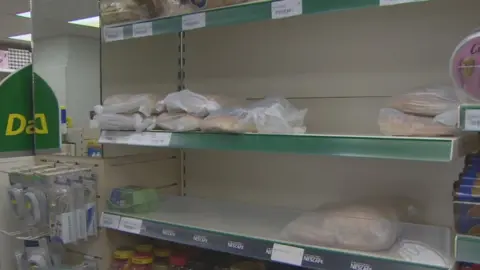Economic cost of snow disruption 'much smaller' than predicted
 BBC
BBCThe economic cost of the recent severe weather may not be as bad as predicted, according to independent researchers.
Many firms were forced to close or cut back on production after snow storms hit most of the country last week.
That led to claims of a loss in economic output at between £200m and £300m over a three or four-day period.
But the Fraser of Allander Institute has suggested increased production in the coming months could more than make up for the losses.
It points to the last period of severe weather in Scotland in the final quarter of 2010.
Overall, the Scottish economy contracted by 0.7% during that time.
Temporary impact
The biggest falls were in production, of which manufacturing was particularly badly hit, and construction.
But in the first quarter of 2011, output grew 0.9%. Output continued to grow through the remainder of 2011 and added a further 0.9% to Scottish GDP.
The Fraser of Allander Institute, which is based at Strathclyde University, said: "In our view, any impact on the Scottish economy is likely to be much smaller - and temporary - than you may initially believe to be the case.
"Firstly, most of the estimates of the potential impact are based on guesswork. Figures suggesting a 20, 30 or 50% reduction in activity are very much at the speculative end of the spectrum.
"In the modern economy, a greater proportion of the workforce is able to work remotely than in the past. Even then, we're talking about two or three days of displaced activity out of over 60 working days in a three-month period.
"Secondly, some of the impacts that we hear about are simply displacement of activity. For example, whilst petrol sales will have fallen because of fewer people out on the roads, sales of gas and electricity will have risen as more people stayed at home.
"Thirdly, a lot of the impacts will be temporary. Output will slow - possibly sharply - over the week of the disruption but then pick-up in the days ahead. But our economy can be remarkably resilient to such short instances of any break in activity."
Increase capacity
The institute predicts money saved by consumers during the cold snap will mean purchases are delayed rather than cancelled.
It said: "Footfall at shops, leisure facilities and theatres may fall but the money saved by many families this weekend will be spent in the future. Similarly, most firms that were forced to close last week will seek to increase capacity over the coming days to make up for lost production or activity.
"This is not to say that there will be no impact. The longer any disruption in activity lasts for, the more likely it is to have an impact on supply chains, and this will have a much more sustained negative impact.
"For individual firms, it could be highly significant. Firms most exposed will be those involved in perishable goods, such as farmers, restaurants and cafe owners. Small businesses are also likely to be more exposed than larger firms to cash-flow issues if payments have not been made or deliveries not met."
Many stores in snow-hit areas of Scotland ran short of basic items such as bread and milk after the "Beast from the East" hit deliveries.
Deputy First Minister John Swinney said on Saturday that shops were being "restored to their normal supplies".
